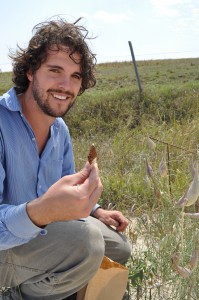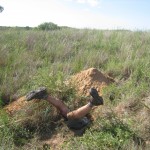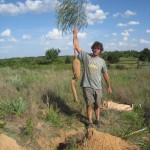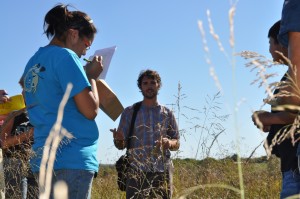Quinn Long: Botanist

Quinn’s interest in studying and protecting the natural world has led him on adventures through a handful of countries with diverse ecosystems and given him the chance to continually indulge two of his passions: teaching and learning.
Quinn applied to the University of Kansas to earn a master’s degree in ecology and evolutionary biology. He was destined to get a Ph.D. instead — during the graduate admissions process, the department nominated him for a Self Fellowship, which changed his status from master’s student to doctoral student. He was selected for the prestigious KU fellowship, which funded four years of graduate studies and provided valuable training in grant writing, public speaking and media relations.
In his six years of doctoral research, Quinn focused his efforts on increasing the diversity of prairie restorations. “When most people think about imperiled ecosystems, they probably think of the Amazon,” he said, “and that’s completely valid. But the tallgrass prairie region where we now live — a landscape we have greatly modified — is also endangered. Only one percent of the historical extent of tallgrass prairie remains intact, so restoration is very important for the viability of the entire ecosystem.”

As a botanist in the Native Medicinal Plant Research Program, a position he took soon after finishing his doctoral work, Quinn spends time in the field, identifying and collecting plants that may have medicinal potential. Calling himself the project’s “designated shovel operator,” he acknowledges that physical labor is a large part of his job several months of the year, but he enjoys the challenge of unearthing massive roots that have been used in traditional medicine. He and other members of the program visit state parks, wildlife refuges and wildlife management areas in Kansas and other Great Plains states as part of their work. Quinn also takes charge of obtaining permission from public agencies and nongovernmental organizations to collect plants on their properties.

Like many staff members in the medicinal plant program, Quinn got an early start learning about plants and nature. He was raised in rural Missouri in the northern Ozarks, and many of his early memories are of playing in the woods, camping and backpacking. “I was just always happy to be out hiking and exploring the natural world,” he said.
Though his parents weren’t trained conservationists or ecologists, their fondness for the outdoors sparked Quinn’s interests. When he was young, his family bought a farm, in the picturesque area near Hermann, Missouri, that had been poorly managed and was overgrown with invasive species. Land stewardship became an ongoing family project, which led to Quinn’s interest in restoration and plant studies. He credits the farm experience with his interest in the temperate region of the Midwest. “I studied tropical ecology, and I’m fascinated by the tropics,” he said. “I think without the personal connection that managing our land has fostered, I probably would have ended up in the rainforest.”
Quinn’s passion for tropical ecology began early as well. At 11, he traveled to Belize and Guatemala with his father. “He wanted me to see the rainforest before it was gone,” he said. He enjoyed learning about that unique ecology and, at the same time, about life in third-world countries: “I was shocked at how it made me aware of the material excess I see here.”
Quinn has been back to Central America and Mexico numerous times. While participating in a summer rural sociology program, he traveled to Costa Rica and Panama. Later, when he learned that one of his undergraduate teaching assistants was directing a raptor migration monitoring program in Veracruz, Mexico, he jumped at the invitation to take another trip south. He traveled throughout the area, visiting different nature reserves. At KU, he took part in the Organization for Tropical Studies ecology course in Costa Rica, and he has since traveled independently to Chihuahua, Nicaragua and Panama, and volunteered at a nature reserve in Costa Rica.
It comes as no surprise that Quinn speaks Spanish fluently. He took Spanish courses in high school, but he learned the language best through immersion during his time in Central America.

Quinn enjoys teaching children and adults about the natural world. For the past several years, he’s led elementary students on botanical scavenger hunts through the Baker Wetlands just outside Lawrence, Kan. He also has led group tours of the KU Field Station, particularly the Rockefeller Prairie. “I enjoy that kind of outreach,” he said, “and just having the chance to get people excited about the natural world in their own backyard.”
While working on his Ph.D., Quinn had the opportunity to teach courses in KU’s Department of Ecology and Evolutionary Biology. He taught field ecology and introductory biology. “That was fun because I got to foster excitement in students through their first exposure to ecology, especially in the field,” he said. “They really light up, learning about stream ecology, prairies and forests.”
Now that Quinn has finished his graduate studies, he has more time to think about the future. “Towards the end of my doctoral program, I was so busy working on the immediate tasks at hand that I didn’t have time to step back and take a look at the bigger picture,” he said. “I come up with ideas all the time. We’ll see what happens.” Among his list of possible goals are extensive traveling, teaching and even an entrepreneurial venture. For now, he’s happy working on the medicinal plant program, which allows him to do what he loves while thinking about next steps in his life.
Even when Quinn is away from work, he spends a lot of time outdoors. He enjoys hiking and birdwatching with his fiancée and their dog, and riding his bike. He has a catamaran and loves to sail when conditions and time allow. He visits his family in Missouri whenever possible to continue restoring the prairie and woodlands and to lend a hand with the many projects always under way at the farm.
Growing up, Quinn didn’t realize his love of nature would develop into a career. “As an undergraduate, I met a restoration ecologist and thought, ‘Huh, I didn’t realize that was a profession. That sounds cool,” he said. He may not classify some of his study of medicinal plants as work. “I love being out in open country, learning about plant communities and observing wildlife,” he said. “Just being outside in the natural world is fulfilling for me.”
— Lindsey Siegele
Graduate assistant, communications and outreach
